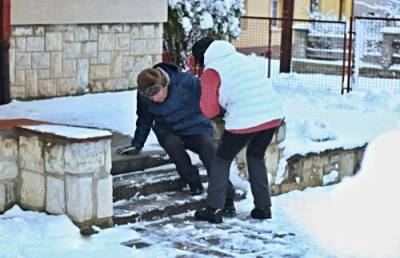Filing a Personal Injury Claim for an Injury Caused by Snow or Ice
 Winter rolls around every year in the Midwest, and with it comes snow and ice, especially this year. Inclement weather may seem like an inconvenience when flights are delayed or cancelled, but it can also cause serious issues on public roads and walkways. In some cases, large accumulations of snow and icicles can create ice dams, leading to significant water damage in homes and buildings once the precipitation starts to melt. In addition, when ice coats a sidewalk or stairs, it increases the likelihood of a person slipping and falling on the slick surface if it is not cleared or salted. Falling icicles can also impale an unsuspecting individual who is standing below them. A personal injury claim may help someone pursue compensation for winter injuries if a property owner acted negligently and ignored the hazard.
Winter rolls around every year in the Midwest, and with it comes snow and ice, especially this year. Inclement weather may seem like an inconvenience when flights are delayed or cancelled, but it can also cause serious issues on public roads and walkways. In some cases, large accumulations of snow and icicles can create ice dams, leading to significant water damage in homes and buildings once the precipitation starts to melt. In addition, when ice coats a sidewalk or stairs, it increases the likelihood of a person slipping and falling on the slick surface if it is not cleared or salted. Falling icicles can also impale an unsuspecting individual who is standing below them. A personal injury claim may help someone pursue compensation for winter injuries if a property owner acted negligently and ignored the hazard.
Dangerous Weather Conditions Can Lead to Serious Injuries
Many people know that shoveling wet, heavy snow can put a strain on an individual’s heart, so doctors warn about older people trying to clear snow on their driveways. However, venturing out in the winter can also lead to serious and even life-threatening injuries. Not only does driving pose a hazard but simply just walking can put some at risk.
Below are a few of the most common types of injuries that people sustain from falling on snow-covered ice:
- Muscle sprains/ligament strains
- Spinal compression fractures
- Head trauma (concussion or traumatic brain injury)
- Broken wrists and hips
- Dislocated shoulder or knee
- Eye damage
Some of the above injuries could require surgery, and a victim may be in the hospital for days, weeks, or months. An injury victim may need physical and/or occupational therapy, in addition to prescription pain medication, which can result in extensive out-of-pocket costs in the form of lost income and medical bills.
Unnatural Accumulation
Illinois property owners have a duty of care to keep their grounds free and clear so guests remain safe. Although owners are not responsible for a natural accumulation of snow or ice, they can be held liable for injuries that are caused by unnatural accumulations. This may refer to standing water that turned to ice due to a pothole that was never filled. When a homeowner or building manager is aware of such hazards but fails to repair them or warn guests that they exist on the property. If a patio, parking lot, driveway, or deck is known to accumulate ice or snow in the winter, the owner must clear it by shoveling or snowblowing it or putting salt down to prevent anyone from slipping and falling. A specific defect in the property such as a non-working drain or downspout can also cause the unnatural accumulation. In some cases, a property owner could face liability if he or she aggravated a natural condition or created a new, unnatural condition by moving snow to an area where it causes a danger to patrons.
Contact a Wheaton Personal Injury Attorney
Winter weather can cause many problems, which can lead to serious accidents and injuries whether you are riding in a vehicle or walking outside. If you are suffering after a snow or ice related incident, it is important to explore your legal options for pursing compensation. A diligent DuPage County personal injury lawyers can help you determine if a negligent party was responsible for your wintertime injury. At The Law Offices of David W. Clark, P.C., we have more than 20 years of proven experience helping victims recover damages in many kinds of accidents. Call us today at 630-665-5678 to schedule your free consultation.
Sources:
https://www.ilga.gov/legislation/ilcs/fulltext.asp?DocName=073500050K2-1116
WE DON'T GET PAID UNTIL YOU DO!
Free Initial Consultation
630-665-5678
Our attorneys aggressively pursue every avenue to ensure that you are properly compensated for your pain and suffering, medical costs, or lost wages as soon as possible. You pay nothing until you receive the judgment or settlement you deserve.











